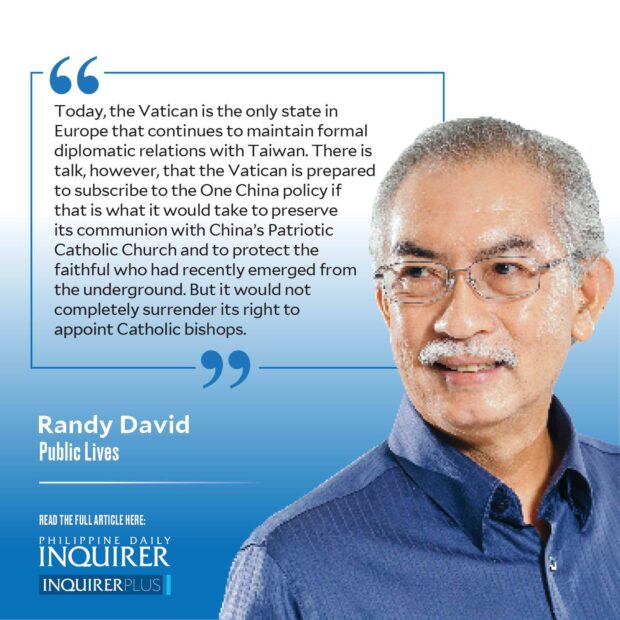There are about 10 million Catholics in today’s China. The majority of them worship in churches authorized and supervised by the government. They are officially called the Chinese Patriotic Catholic Association. The rest of China’s Catholics, until recently, refused to attend these state-sanctioned churches, preferring instead to congregate in small prayer groups in the privacy of their members’ apartments. They are known as China’s “underground” church.
In September 2018, Pope Francis sought to heal the division between the two communities by entering into a secret agreement with China’s leaders, whereby the core issue regarding the appointment of bishops would be a shared responsibility between China’s political authorities and the Pope. Renewable every two years, the provisional agreement recognizes the Pope’s power to appoint bishops but restricts his choices to the names submitted by the Chinese government. The net gain from this compromise, as the Vatican saw it, was that it would enable China’s underground Catholics, including some bishops, to surface and join their brethren in the patriotic church in the safe and open practice of their faith.
The agreement was renewed in October 2020, and then again, according to Vatican sources, in 2022. But, in light of recent developments, it now appears that the Chinese authorities allowed it to lapse in 2022. In November last year, according to a report from the Vatican news network Zenit.org, the Chinese authorities installed Bishop John Peng Weizhao as auxiliary bishop of Jiangxi without the Holy See’s authorization. This was followed by the installation in April 2023 of Monsignor Shen Bin as the new bishop of Shanghai, again without the mandate of the Vatican. During the ceremony of his investiture as Shanghai’s bishop, Bishop Shen Bin declared that he “would adhere to the principle of independence and self-government,” a statement that could easily be construed as a step toward secession from communion with the Roman Catholic Church.
There were other issues that signified that the provisional agreement was not working as the Vatican had hoped. The Beijing authorities had drawn up their own ecclesial geography, reshaping diocesan boundaries and putting some dioceses under the administration of other dioceses. Worse, China showed no urgency to fill up sees that have long been vacant. Pope Francis has consistently counseled patience in the face of Beijing’s chronic nonresponse to inquiries about how to speed up the implementation of the agreement.
In the early 1950s, following an incident, China broke off all diplomatic relations with the Vatican State, leaving China’s Catholics practically orphaned. A few years later, during the Cultural Revolution, religious practice was outrightly forbidden. It was not until the 1980s, with the gradual opening of China under Deng Xiaoping, that churches were allowed to reopen to worshippers. It was during this period that the so-called Catholic Patriotic Association of China emerged, with the Chinese political authorities wielding the power to appoint bishops—a medieval prerogative that was enjoyed by Europe’s monarchs until the 19th century.
Diplomatic relations with the Holy See, however, were not restored. Today, the Vatican is the only state in Europe that continues to maintain formal diplomatic relations with Taiwan. There is talk, however, that the Vatican is prepared to subscribe to the One China policy if that is what it would take to preserve its communion with China’s Patriotic Catholic Church and to protect the faithful who had recently emerged from the underground. But it would not completely surrender its right to appoint Catholic bishops.
Thus, beyond calling Beijing’s attention to the recent installation of new Chinese bishops who have not received the approval of the Holy See, the Vatican has been reluctant to say anything more. Clearly, Pope Francis would not easily give up hope of reuniting China’s underground and patriotic branches. To this end, he has been doing his utmost to make the dialogue with China’s leaders, which has been going on for more than three decades, bear fruit. He has warmly welcomed pilgrims from the Chinese Patriotic Church on their visits to Rome and has resisted making any critical remarks about the state of human rights and religious freedom in China.
This policy of patient appeasement has not been without its critics. Hong Kong’s retired Cardinal Joseph Zen, a venerable prelate who has been criminally charged for not registering a fund-raising initiative to help those who have suffered repression in the hands of HK’s China-backed regime, has called the controversial agreement a “sell-out.” In a BBC interview, he said: “A bad agreement makes the situation worse. Without an agreement, we have to tolerate many things but that’s okay. Our faith tells us that we have to suffer from persecution. The communist regime never changes its policies. They don’t need to compromise. They want a complete surrender.”
Indeed, it is not easy to understand why China, which, in the 1980s, threw open its economy to foreign investors at great risk to its autonomy, would play hardball with an entity like the Holy See, which, though it carries a lot of soft power, possesses neither the army nor the economic power to threaten its established government. Does Xi Jinping feel so wary of the outspoken 91-year-old bishop of Hong Kong, Cardinal Zen, that he would not settle for anything less than total control of China’s Catholic communities?
——————
public.lives@gmail.com
